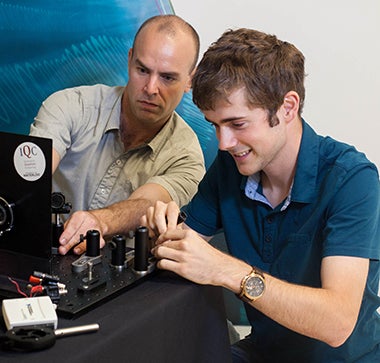
Not your typical week at camp
High school students explore the fascinating trails of quantum cryptography

High school students explore the fascinating trails of quantum cryptography
By Christian Aagaard Communications and Public Affairs
Their luggage contains the usual survival kit for camp -- an iPod, toothbrush and cash for incidentals.
But 42 students spending five days (Aug. 12-16) at the Institute for Quantum Computing (IQC) bring something else that doesn’t stuff neatly into a travel bag:
Tonnes of curiosity.
In five years, the Quantum Cryptography School for Young Students (QCSYS) has grown from a handful of local youth to a group drawn from homes around the world.
Most attendees are in grades 11 and 12, and they get in by pitching themselves as prime candidates. Applications for 2013 numbered 150. They cover their own travel costs, but the program is free of charge, thanks to IQC’s dedicated fund for scientific outreach, and support from PromoScience, a national program of the National Science and Engineering Research Council, to encourage young people to consider careers in science and engineering.
“We aim to teach them how mathematics and fundamental science – quantum physics in this case – can be harnessed into cutting-edge technology,” says Martin Laforest, IQC’s senior manager, scientific outreach and director of QCSYS since 2010.
“You see their eyes open as they realize what they are learning in high school can be useful. We bridge the gap between what they learn and how they can use it to do really cool and transformative stuff.”
A year of firsts
Cryptography explores how information can be encrypted and protected from third-party prying. Quantum information, the exciting promise of processing information at the quantum mechanical level, deepens the possibilities of encryption.
The thread for QCSYS goes back to Michele Mosca, co-founder and deputy director academic of IQC. He saw a quantum cryptography camp as another opportunity to bring younger students together around a shared passion for math, physics and computer science
This year, the camp welcomes its first student from Africa. This is also the camp’s first year in the new complex housing IQC and the Waterloo Institute for Nanotechnology – the Mike & Ophelia Quantum-nano Centre.
On a typical day, students attend lectures, try experiments in labs and participate in peer-led problem-solving and discussion. They might take in a movie at night, or a trip to a go-kart track.
Everybody stays in residence on campus, even if home is a 10-minute stroll away. Five counsellors – all of them UW students with a range of majors – act as mentors and chaperons.
Christopher Sutherland, a senior in Waterloo’s mathematical physics program, signed on as a junior counsellor two summers ago. This year, he is the head counsellor and will make his debut as a lecturer.
From QCSYS, he says, he has picked up the fine art of explanation.
“It has taught me the importance of the ability to communicate ideas to people who might not be 100 per cent in this environment.’’
Laforest, who also lectures at the camp, enjoys getting back to basics and observing the differences in the way students learn. Some, he says, seem to be driven by hard numbers; others thrive on intuition.
“Sometimes we forget the big picture and why we do what we do,” he says. “This keeps you grounded.”

Read more
Here are the people and events behind some of this year’s most compelling Waterloo stories

Read more
Meet the 14 exceptional students representing Waterloo’s newest grads

Read more
More than 100,000 children and youth from across the region are discovering the wonders of science and technology through the University of Waterloo
The University of Waterloo acknowledges that much of our work takes place on the traditional territory of the Neutral, Anishinaabeg, and Haudenosaunee peoples. Our main campus is situated on the Haldimand Tract, the land granted to the Six Nations that includes six miles on each side of the Grand River. Our active work toward reconciliation takes place across our campuses through research, learning, teaching, and community building, and is co-ordinated within the Office of Indigenous Relations.